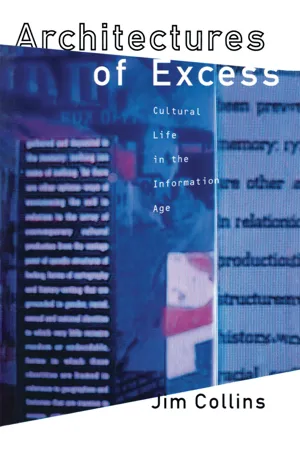
Architectures of Excess
Cultural Life in the Information Age
Jim Collins
- 256 pagine
- English
- ePUB (disponibile sull'app)
- Disponibile su iOS e Android
Architectures of Excess
Cultural Life in the Information Age
Jim Collins
Informazioni sul libro
First Published in 1995. Much of recent theory has characterized life in media-sophisticated societies in terms of a semiotic overload which, allegedly, has had only devastating effects on communication and subjectivity. In Architectures of Excess, Jim Collins argues that, while the rate of technological change has indeed accelerated, so has the rate of absorption. The seemingly endless array of information has generated not chaos but different structures and strategies, which harness that excess by turning it into forms of art and entertainment. Digital sampling in rap music and cyber-punk science fiction are well-known examples of techno-pop textuality, but Collins concentrates on other contemporaneous phenomena that are also envisioning new cultural landscapes by accessing that array--hyper-self-reflexivity in mall movies, best sellers, and prime-time television; the deconstructive vs. new-classical debate in architecture; the emergence of the "New Black Aesthetic;" the development of retro-modernism in interior design and the fashion industries. The analyses of these disparate, discontinous attempts to develop a meaningful sense of location, in an historical as well as a spatial sense, address a cluster of interconnected questions: How is the array of information being "domesticated?" How has appropriationism evolved from the Pop-Art of the sixties to the sampling of the nineties? How has the relationship between tradition, innovation, and evaluation been altered? Architectures of Excess investigates how these phenomena reflect change in taste and subjectivity, considering how we must account for both, pedagogically.